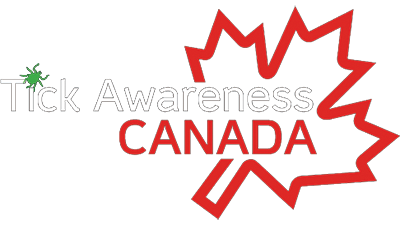Prevention
Posted on 10 April 2023.
How to prevent tick bites
Many areas of the Canada are at high risk for Lyme disease. People who live/work/recreate in Lyme-endemic areas or tick habitat may be exposed to ticks in a variety of settings – campsites, parks, golf courses, sports fields, and their own back yards. Spending time outside gardening, hiking, walking your dog or hunting can increase your risk of encountering ticks. Pet ownership is associated with an increased risk of Lyme disease.
Ticks occur year-round but they are most active during spring, summer and early fall (April-September) but adult female ticks can also infect individuals during the winter. Ticks live in grassy and brushy and wooded areas and on animals. The best way to ensure you don’t get bitten is by eliminating close encounters.
- 1. Avoid wooded areas with high grass and leaf litter. Walk in the center of trials.
- 2. Wear long sleeved shirts.
- 3. Wear white or light colored clothing to make it easier to spot ticks.
- 4. Spray tick repellent on clothes and shoes before entering the woods.
- 5. Wear long pants and tuck your socks in your pants.
- 6. Wear closed footwear.
Maintain your yard
By reducing the tick population around the home, one can minimize the risk that family members or friends will be bitten by a tick.
You can place a deer fence high enough to prevent deer and small animals from entering your yard. If this is impractical you can remove plants and trees that attract deer to your yard such as apple, pear and cherry trees, rhododendrons, rose bushes, pansies, daisies, lilies, tulips, and black-eyed susans. Deer are almost always infested with feeding ticks. These ticks drop off deer wherever they happen to be, whether in flower beds or lawns.
The majority of ticks found on a property are located in close proximity to a lawn’s perimeter with woodlands, stone walls, perennial beds and garden plantings. Pesticide spraying of these particular areas can help prevent getting tick bites in your own yard. The most common pesticides used for tick control are permethrin, befenthrin and cyfluthrin. For those not inclined to use synthetic chemicals, natural organic spray alternatives are available, such as Garlic or cedar oil and a mixture of rosemary and peppermint oils. Another great tip is the placement of tick tubes.
Keep the grass in your yard short and create low risk zones for dining and recreational use. Homeowners should also eliminate heavy brush and ground cover close to home and replace it with mulch and other less dense alternatives. https://www.cdc.gov/ticks/avoid/in_the_yard.html
What Are Your Risks Working Outdoors?



